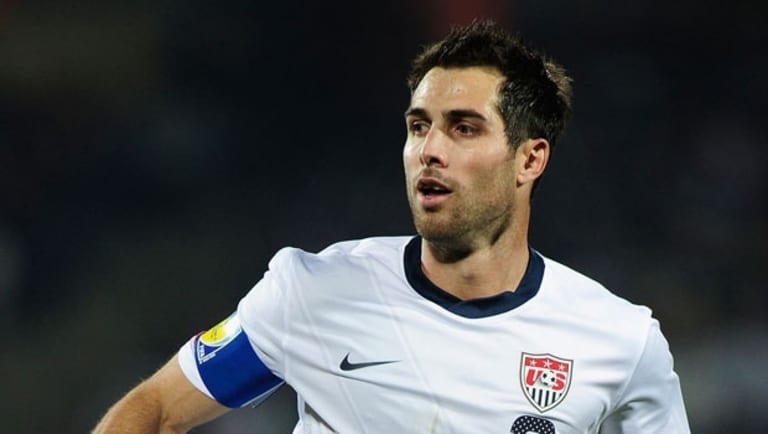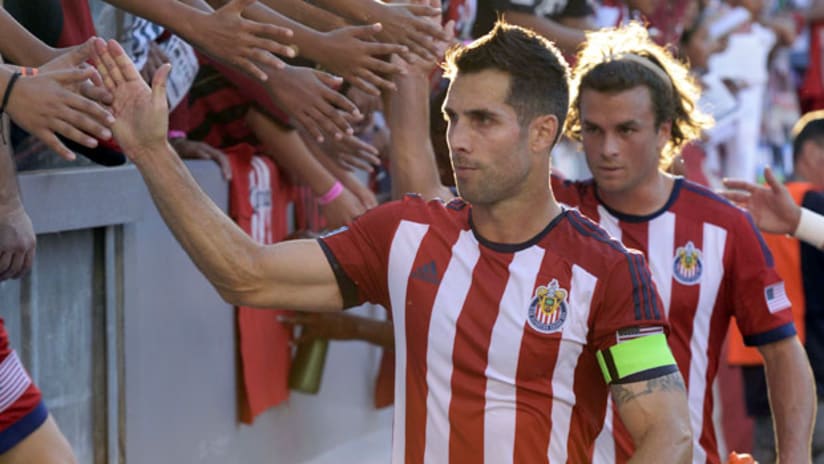The enduring image of Carlos Bocanegra for American soccer fans will always be from those television shots taken during the national anthem just before a big game: the US captain's armband tightly gripping his bicep, his chin out, a slight smile on his face and a proud look in his eye as he sang every word of the Star-Spangled Banner.
For four years, he was a symbol of strength and confidence, with maybe just a touch of hubris.
So when Bocanegra was introduced as a Chivas USA player last June, it was surprising in a way that there was very little fanfare. It was hardly a homecoming befitting a long-time national-team captain.
But even after 110 international caps and 14 US goals, Bocanegra understood. The final few years of his decade-long European adventure had been quiet compared to his long stint at Fulham. Perhaps more importantly, Chivas USA were struggling, on and off the field.
- RIVALRY WEEK: Chivas USA-LA Galaxy SuperClasico, Sun. 3 pm ET, UniMas
But the 34-year old put his head down and got to work, recalling the lessons he learned along the way. Lessons he learned as a young player for the Chicago Fire, when veterans like Peter Nowak, Lubos Kubik and Hristo Stoitchkov would show up for work in the morning. Lessons he learned from Eddie Pope, Jeff Agoos, Earnie Stewart, Cobi Jones and others when he was a new kid on the US national team.
"I try to lead by example and by being a positive guy," Bocanegra told MLSsoccer.com. "On the field, I try to be competitive and always work hard and encourage other guys. That's what rubbed off on me when I was a young player, seeing the guys who brought it every day."
Sounds basic enough, but bringing leadership to a team that was as rudderless as Chivas USA last year was not easy. Getting beaten is one thing. Getting drubbed in an empty stadium is another, especially for a player with experience in so many huge matches. Through the final month of last season, Bocanegra held on to one simple thought:
This isn't that bad.
"Teams in dire straits in MLS are a lot different than teams in dire straits in Europe," Bocanegra says. "What I went through with [Scottish club] Rangers and [Spanish club Racing de] Santander, that was dire straits. With MLS, at least the players know they're going to get paid. I felt we could recover."
The recovery did not go quite as planned. Shortly before the 2014 season kicked off, it was announced that MLS was taking control of Chivas USA, testing Bocanegra's focus. The change was not necessarily a bad thing, because the club's original business model was not working. But any mental preparation Bocanegra could have done for the new season was altered with a bevy of potential distractions.
"I'm interested in everything that's going on," Bocanegra says. "But it's not going to be hanging over my head. I think MLS has done a great job so far. We know they're going to sort it out and take care of us. They've always wanted two LA teams and two New York teams, so in a way, we feel like this is part of a master plan. I'm anxious to see it through."
On the field so far – albeit through only four games – Chivas USA have been competitive, heading into Sunday's rivalry clash against the LA Galaxy (3 pm ET, UniMas): A win in their home opener, a draw in Week 2, a road loss against first-place FC Dallas, and a credible road tie against the New York Red Bulls last Sunday. The challenge now for the captain is to make sure his team's mentality doesn't wane.
"We cleaned house, we've got 13-14 new guys, including some veterans, some guys who've been in the league, hard workers you can count on," Bocanegra says." With guys like Mauro Rosales and Tony Lochhead, we'll be competitive and stay in games. We're pretty optimistic we can begin to turn things around this season."

With the World Cup a little more than two months away, it is also a time of reflection for Bocanegra, whose last international appearance came just before the 2014 qualifying campaign began. He has made no formal statement that his international career is over, and he does not plan to make one, due in part to a vow he made when he began playing for the US.
"I told myself I want to play at the highest level as long as I could," Bocanegra says. "When it's over, you can't ever do it again. So as long as I'm playing at a professional level, I'm not closing the door. Saying that, I'm not holding my breath.
"I've always wanted to play for the national team until the coach didn't want to call me in anymore," Bocanegra continues. "I hold my head up high. I had a fantastic time being with the national team for 12 years and being captain. Those were the best years of my life. The US team catapulted my career, along with MLS. The national team was so good to me. It was an honor and a privilege every time, especially in a major tournament. I get chills when I hear the national anthem, knowing your whole country is behind you."
His greatest memory comes from the hours after Landon Donovan's landmark game-winning goal against Algeria, which pushed the US into the second round of the World Cup in South Africa.
"It was like a walk-off home run to win a playoff baseball game, and we all went crazy," Bocanegra says. "But we had no idea the reaction back home until we saw all those videos from the bars. At that moment, it was pure euphoria. We felt the whole country was behind us. And we knew after that we had done something to make the whole country proud. Not just soccer fans, but Americans in general. Things like that are what I'll remember. The games are so much fun, but that moment, that was beyond that."
While he does not want to talk about the end of his career, Bocanegra knows there will come a point in time when he's ready to give back, as a coach or technical director, with an MLS club or the national team. He knows his life in soccer is really just beginning.
"I feel like I could've benefited from being in a professional setup sooner, learning under top players," Bocanegra says. "Maybe that would've put me slightly ahead of where I was. So, that's one thing I start to think about: how to accelerate player development."
Now as a player and later in other roles, Bocanegra looks forward to sharing what he has learned, beginning with his rookie year with the Fire in 2000 and continuing on his journey from England to France, Scotland and Spain. There were lessons at every stop.
"Playing in the Premier League, that was the glory league," Bocanegra says. "It was an unbelievable five years in my life. Living in West London was awesome. The crowds. The press. Everything. It was just amazing in every way. Then, I got to play in France for three years, to learn another language, live in another culture. I learned a lot about myself. It's not easy, so you've got to figure it out. That was an adventure.
"Then, my favorite year of my career, probably, was playing for Rangers, a massive club," Bocanegra says. "It was unique to be a part of one of the top clubs in the country. Unfortunately, it didn't work out when they needed to offload my wages. In Spain, I became fluent in Spanish. It was just another experience in life. The thing I feel most fortunate about is that soccer has shown me the world. I immersed myself in everything. When all's said and done, I'll reflect back and be happy. It's been sweet."
And while his return to MLS last summer may have been relatively quiet, Bocanegra believes he's still capable of making some noise.
"I feel very good right now," Bocanegra says. "About everything."













